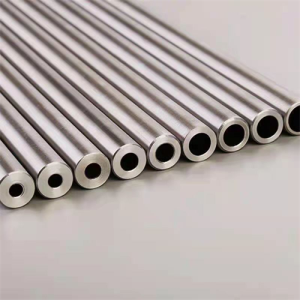Study on the influence of precision steel pipe manufacturing process on material properties.
Research on the influence of precision steel pipe manufacturing process on material properties

As a high-quality pipe, precision steel pipe is widely used in the petroleum, chemical industry, electric power, machinery, aerospace, and other fields. Its manufacturing process has a crucial impact on material performance, which is directly related to product quality and reliability. This article will conduct in-depth research and analysis on the impact of the manufacturing process of precision steel pipes on material properties.
The Manufacturing process of precision steel pipes
The manufacturing processes of precision steel pipes mainly include hot rolling and cold rolling. Hot rolling refers to rolling steel pipes at high temperatures to deform them and obtain the desired shape and size. Cold rolling rolls steel pipes at room temperature to obtain more precise dimensions and a smoother surface. During the manufacturing process, the steel pipe also needs to be straightened, annealed, quenched, tempered, and other treatments to further improve its performance.
The influence of the manufacturing process on material properties
1. Influence of hot rolling process
The hot rolling process has a significant impact on the material properties of precision steel pipes. When rolling at high temperatures, the grains inside the steel pipe will deform, thereby refining the grains and improving the strength and toughness of the material. At the same time, the work-hardening effect produced during the hot rolling process can improve the hardness and wear resistance of the steel pipe. However, the selection of hot rolling temperature and time must be appropriate, otherwise defects such as cracks and holes will appear inside the steel pipe, seriously affecting its performance.
2. Influence of cold rolling process
Compared with hot rolling, the cold rolling process has less impact on the material properties of precision steel pipes. When rolling at room temperature, the grains inside the steel pipe will not undergo significant deformation, so there will be no work-hardening effect. However, cold rolling can precisely control the size and shape of steel pipes, improving their accuracy and surface quality. At the same time, proper cold rolling can improve the coercive force and magnetic permeability of steel pipes, making it more suitable for manufacturing high-precision, high-performance magnetic components.
3. Influence of annealing process
Annealing is an important link in the manufacturing process of precision steel pipes. Its main purpose is to eliminate the internal stress generated during the rolling process and make the internal structure of the steel pipe more uniform and stable. The control of annealing temperature and time has a great influence on the performance of precision steel pipes. If the annealing temperature is too high or the time is too long, the grains inside the steel pipe will grow, reducing its strength and toughness; if the annealing temperature is too low or the time is too short, the internal stress cannot be eliminated and the steel pipe will be damaged during subsequent processing and use. Problems such as deformation and cracking may easily occur.
4. Influence of quenching and tempering processes
Quenching is a process in which the steel pipe is heated above the critical temperature and then rapidly cooled to obtain a martensite structure. Tempering is reheating the quenched steel pipe to a certain temperature and keeping it warm for a certain period to stabilize the organizational structure and eliminate internal stress. The quenching and tempering process has a great impact on the performance of precision steel pipes. The control of quenching temperature and time determines the quantity and distribution of martensite, thereby affecting the hardness and strength of the steel pipe; the control of tempering temperature and time determines the stability and toughness of the organizational structure. Proper quenching and tempering processes can make precision steel pipes have good toughness and durability while maintaining high hardness and strength.
3. Conclusion
The manufacturing process of precision steel pipes has a significant impact on their material properties. Reasonable manufacturing processes can make precision steel pipes have good strength, toughness, hardness, durability, and other properties to meet various complex and high-demand application scenarios. To obtain better material properties, it is necessary to continuously optimize manufacturing process parameters, strengthen quality control and testing, and improve production efficiency and product quality. At the same time, it is also necessary to strengthen basic research and gain an in-depth understanding of the intrinsic connections and laws between the manufacturing process and material properties of precision steel pipes, to provide strong support for promoting the sustainable development of the precision steel pipe industry.


